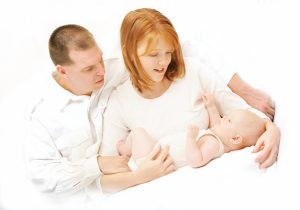How Your Personality Type Molds Your Parenting Style
 Parenting can be the most difficult job in the world. Not only is every decision you make on behalf of that other person going to shape who they become, but it’s the only job where being filled with doubt is normal. If your mechanic approached you and said he fixed your brakes and he just hopes he did it right this time, you wouldn’t pay him a dime!
Parenting can be the most difficult job in the world. Not only is every decision you make on behalf of that other person going to shape who they become, but it’s the only job where being filled with doubt is normal. If your mechanic approached you and said he fixed your brakes and he just hopes he did it right this time, you wouldn’t pay him a dime!
No, we parents are constantly questioning our actions. However, how we behave as parents may have less to do with our exposure to articles and advice, and more with our personality.
In a fascinating study based around the Briggs Myers scale, they discovered that your personality type may have more to do with your parenting style than you may think.
First: What Is The Briggs Myers Scale?
The Briggs Myer scale is an instrument used to determine which type of personality you have. It is based off of studies done by C.G. Jung who took seemingly random personality traits and found order and and consistency between them based on differences in the ways that people use their judgment and perception – creating a type of classification system.
Based on analyzing an individual’s preferences, Myers and Briggs created a classification system to identify 16 distinctive personality types. The most common personality types include the following:
ENFJ – Warm, empathetic, responsive, and responsible. Highly attuned to the emotions, needs, and motivations of others. Find potential in everyone, want to help others fulfill their potential. May act as catalysts for individual and group growth. Loyal, responsive to praise and criticism. Sociable, facilitate others in a group, and provide inspiring leadership.
INTJ – Have original minds and great drive for implementing their ideas and achieving their goals. Quickly see patterns in external events and develop long-range explanatory perspectives. When committed, organize a job and carry it through. Skeptical and independent, have high standards of competence and performance – for themselves and others.
ENTJ – Frank, decisive, assume leadership readily. Quickly see illogical and inefficient procedures and policies, develop and implement comprehensive systems to solve organizational problems. Enjoy long-term planning and goal setting. Usually well informed, well read, enjoy expanding their knowledge and passing it on to others. Forceful in presenting their ideas.
INFJ – Seek meaning and connection in ideas, relationships, and material possessions. Want to understand what motivates people and are insightful about others. Conscientious and committed to their firm values. Develop a clear vision about how best to serve the common good. Organized and decisive in implementing their vision.
The 16 different personality traits are combinations of 8 different pairs of opposite preferences: extraversion (E) and introversion (I), sensing (S) and intuition (N), thinking (T) and feeling (F), judging (J) and perceiving (P).
If you’re curious what your personality type is, you can take the test yourself online.
Back To The Study…
According to the study, INFPs and ISFPs are more likely to be stay-at-home parents, while NTs are much less likely.
Feel like you’re doing pretty well as a parent? Then you may be an ESTJ or ESFJ. When it came to confidence in their parenting, these two were markedly more satisfied with the job they were doing as parents.
Of course, if you’re more on the analytical side as an INTJ, having children may have been a welcome challenge. Their constant mess and chaos is a chance to grow and a welcome one.
In an interesting turn, the INFPs were a bit of a contradiction. Not everyone taking part in the study was a parent, and the INFPs were not only more likely to not have children, but to also say they didn’t want them. You would think this would mean that those that actually had children would be more negative about the whole thing, but the opposite was found to be true. INFP parents were found to be entirely committed to their children with a level of devotion and love any parent would be proud to aspire to.
Naturally, ENTJs are all about having kids. The raising of said kids, however, they tended to leave to their spouse. The data suggested that they felt their best contribution to the family would be supporting and providing rather than staying at home.
As Many Methods as People
If the study shows us anything, it’s that people are as diverse and varied in their parenting styles as they are in personality. So the next time you’re doubting yourself, just remember that you’re not alone.
Tyler is an experienced researcher and writer for organizations that help troubled teen boys. His writing offers real life experiences, humor, and hope for parents of difficult teens. Tyler enjoys bringing honest solutions to families looking for ways to heal. He helps parents by writing valuable information on topics such as education, social media use, behavioral and mental disorders, as well as addiction, Tyler has helped hundreds of families in need.
Follow Tyler on: Twitter | LinkedIn
Tags: parenting, parents, personality









Leave a Reply
You must be logged in to post a comment.